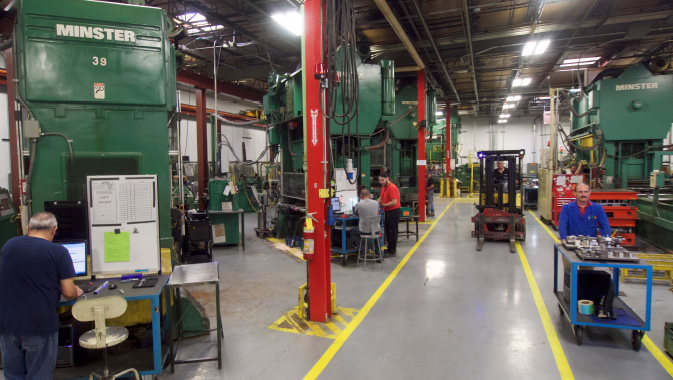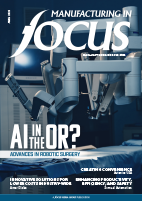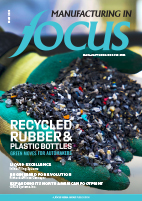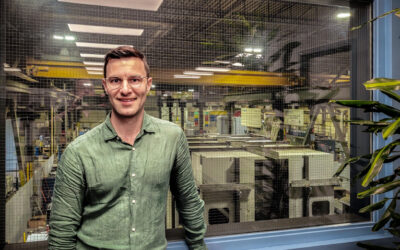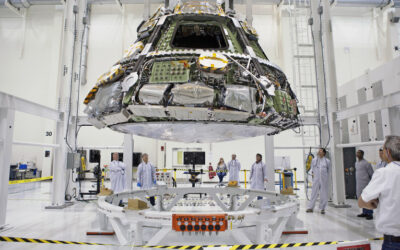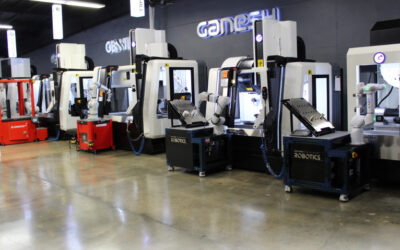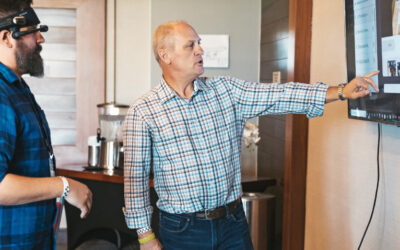Founded over six decades ago, Ramcel Precision Stamping and Manufacturing, LLC, built its success on a foundation of quality work and excellent service. The Northbrook, Illinois-based firm looks to maintain its leading position as a top provider of custom metal stampings, automated assembly, and custom tooling through diversification and consolidation.
~
Ramcel Precision Stamping and Manufacturing, LLC serves the automotive, construction, computer, trucking, defense, consumer durables, consumer goods, mining, and medical sectors. “Automotive is our largest. We’re roughly one-third automotive. Then, we’re pretty diversified across six or seven other key industries, which is atypical of a stamper. Most of them are heavily reliant on automotive. In fact, one or two customers may be seventy – eighty – ninety percent of their business, so we break that traditional mold a little bit and have a much more diversified portfolio than some of our competition,” says President Jason P. Palmi.
Having a broad client base has allowed Ramcel to endure economic downturns while opening avenues for future growth. Consolidation in the form of centralizing company operations is another prime focus at present.
Specific services include custom metal stamping, engineering, prototyping, reverse engineering, automation and assembly, and robotic MIG and TIG welding. “Stamping is the largest,” says Palmi. “Also, as integrators of the supply chain, a lot of the products we sell to our customers are either painted, plated, or heat-treated. We don’t do any of that in-house. As part of supplying a final product to our customer, we will leverage external vendors to become a one-stop shop or a complete solution for our customers.”
While the company is doing well, it wants to expand its clientele even further. To this end, Ramcel is looking closely at markets such as rail, agriculture, marine, and heavy construction.
The company has invested in new equipment to prepare for potential work in new markets. “We went from a twelve-foot bed in our six-hundred-ton press to a fourteen-foot bed in our eight-hundred-ton press. That will allow us to get into more complex or larger parts in general. As the [product] gets bigger, we can move from say, automotive to trucking to rail to marine. A locomotive is much larger than your passenger car, so the parts are a lot larger, so having this type of capability with the larger size bed press means we are now able to entertain customers in those spaces we hadn’t been able to entertain before,” he says.
Recent acquisitions include an eight-hundred-ton Verson Press and a new two-hundred-ton Minster Press. Such purchases reflect more than just a desire to obtain additional work, according to Palmi. “When you deploy that level of capital into a business, especially of this size, it demonstrates the owner’s confidence and commitment to the business and to the employees to continue growing and ensure that we’ve got the footprint needed to further support growth and success down the road,” he explains.
Ramcel has also invested heavily in human capital. The company supports trades education at local colleges and high schools “to ensure the pipeline of talent coming into stamping remains robust.”
While many of the company’s customers are based in Illinois, Ramcel works with firms across North America and Europe.
The company itself was founded in 1950 by one Richard A. Mengarelli and Charles E. Lindgren, in the basement of Mengarelli’s parental home. The first initials of the founders’ full names formed the basis of the company name. It was incorporated in 1951.
While the concentration was on stamping right from the first, the equipment and clientele were quite different from today. “When the doors first opened, our largest press was 150 tons,” says Palmi. And a key customer was Polaroid, makers of the pioneering camera that produced instant photographs. Ramcel went on to acquire bigger presses while digital photography put a massive crimp in Polaroid’s business.
The Polaroid experience helps explain why Ramcel today has such a broad customer base. “Part of the reason we’ve focused on diversification and making sure we have a pipeline of new customers has been to protect ourselves against industry and general economic trends. As the business continued to grow, we continued to invest in additional equipment and capabilities to make sure we were never industry -or customer-dependent,” he explains.
Over the years, Ramcel survived and thrived and experienced a change in ownership. The firm was eventually bought by Palmi and his father Rocco Palmi, who had been a top Ramcel executive. Rocco Palmi remains active today as company chief executive officer.
Palmi returns to a familiar theme when asked if there was a secret to Ramcel’s longevity. “I think a lot of it goes back to diversification. A lot of our competitors in ’08 and ‘09 were forced to close because they were so heavily reliant on the automotive supply chain for business. Whenever you’ve got a lot of pricing pressures or an economic downturn, if you’re not diversified and you can’t generate other sources of revenue, [it’s tough] to survive.”
The company currently has 120 full-time employees, who work two shifts at the company’s three locations. Ramcel wants new hires who are “motivated self-starters who are curious about what it is they’re doing and why. What has allowed us to be successful over the years is getting somebody in a role who sort of challenges why we are doing something. Those people tend to generate the best ideas on how to improve a process.”
The company has developed what it calls the 2020 Vision, a reflection of its desire to diversify, consolidate operations, identify efficiencies and maintain excellence.
Ramcel is committed to excellence, and this is reflected in several industry quality certifications, including ISO 9001:2008, ISO/TS 16949:2009, and ISO 14001:2015. The firm recently acquired IATF 16949:2016 certification, an automotive industry standard.
“We’ve got a fully-staffed quality team. We also leverage outside resources to ensure we continually audit ourselves and have others audit us,” says Palmi. Similarly, the company adheres to strict safety guidelines and training, based around Occupational Safety and Health Administration (OSHA) protocols.
When possible, Ramcel likes working with the same suppliers. “Over our long history, there are a few vendors we try to focus on. If a customer might require something a bit [beyond] their skill set, we’re happy to expand that network, but there is a core of strategic vendors that we deal with that we’ve been partnering with for a number of years now.”
“We’ve helped a lot of companies over the years exit manufacturing and become, if not their largest stamping vendor, an integral part of their new supply chain. We’ve been able to leverage our expertise and our ability to produce a wide range of products to very tight tolerances and helped as other companies decide to re-evaluate their supply chain.”
Ramcel will be attending FABTECH, a three-day conference for the fabrication, metal forming, and welding industries, taking place in Atlanta this November. Building personal relationships has also been central to Ramcel’s promotional efforts. Forging strong ties with individuals in various corporate departments, including purchasing, quality, engineering, and product design, has proven hugely beneficial.
When such officials “take on new and bigger roles, we’ve sort of been someone they’ve taken along for the ride. A lot of our growth over the years is due to maintaining excellent relationships and excellent service and [providing] excellent quality,” he says.
The firm maintains relationships of a different sort with various charitable groups and “local organizations that support veterans and patriots and wounded warriors,” states Palmi.
He says a lack of job applicants due to low unemployment is the company’s biggest challenge. “The general level of economic favorability in the last couple years has created a challenging environment. Getting people who want to work for wages that will help us remain competitive was our biggest challenge last year and will likely be for the foreseeable future.”
This challenge is particularly frustrating, as Ramcel is eager to expand its engineering department. “We’re looking to hire mechanical and design engineers to get a bit more upfront and personal with customers on the front end of the part quote, initial part design, and part redesign. We’re also looking to expand our capabilities in things that support stamping like in the tool room or wire cutting or CNC machining and milling.”
Currently, the company operates three facilities in the Northbrook area. The plan is to consolidate into one large facility to streamline resources, processes, and services. “I think, five years down the road, I would like to see us consolidated under a single real estate footprint as well as have some new customers in transportation or marine or automotive or other spaces in which can’t currently play with. So, to get it under one roof and be able to supply a wider and more diverse customer base.”

